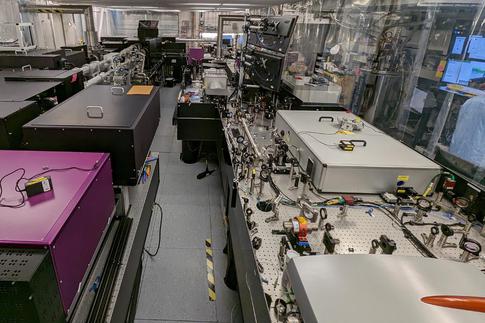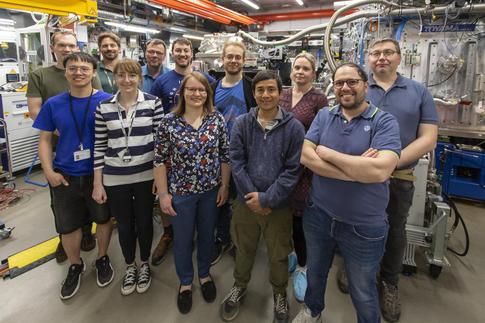XFEL: New DiPOLE laser blasts off
New DiPOLE laser blasts off
A state-of-the-art laser has been commissioned at European XFEL and used for its first user experiment, paving the way for new scientific insights. The DiPOLE 100-X laser delivers ultra-powerful bursts of green light that can transform matter into extreme states, allowing scientists to study its behavior at high temperatures and pressures. Over 100 international researchers were involved in the first experiment.

The new DiPOLE laser at the HED experiment station. Copyright: HZDR
DiPOLE, or Diode Pumped Optical Laser for Experiments, is a new type of laser that can generate high-energy bursts of green light very efficiently. At European XFEL’s high-energy density (HED) instrument, one such state-of-the-art laser was operated for the first time in late 2022. Developed by scientists at the Science and Technology Facilities Council’s Central Laser Facility (CLF) in the UK in the framework of the HiBEF user consortium, the laser can deliver up to 10 high energy pulses per second. These powerful pulses are just a few nanoseconds long, and can be used as a ‘hammer’ to create intense shock-waves in different types of matter.

Some of the team members of the first DiPOLE experiment. Credit: European XFEL
"DiPOLE’s high-energy pulses enable us to create conditions with pressures of up to 10,000 tonnes per square centimetre and temperatures above 10 000 degrees in a very short time,” says Erik Brambrink, high energy laser scientist at European XFEL who integrated the DiPOLE laser into the HED instrument together with colleagues from European XFEL, Helmholtz-Zentrum Dresden-Rossendorf and DESY. 10 000 tonnes per square centimetre is similar to the weight of an aircraft carrier on a tennis ball. “This will allow to study a wide range of phenomena from understanding how matter behaves in planetary interiors to material failures in industrial applications.”
Learning about extreme states of matter opens up a new field of scientific exploration, allowing scientists to create states of matter that only exist on distant exoplanets or deep within the interior of the Earth. DiPOLE, in combination with European XFEL’s ultrashort X-ray pulses, will enable such avenues of study, as well as allowing users to make more efficient measurements because of the greatly increased number of pulses it delivers per second.
Users of the European XFEL facility are already benefitting from the DiPOLE 100-X laser. Last month, the first user experiment using DiPOLE was conducted, featuring a proposal from a large community of over 100 international users. This collaborative effort was designed to push DiPOLE to its limits right from the start, examining how different materials transform under high pressures and temperatures. Over the coming 12 months users will employ DiPOLE for further studies of other important materials, such as carbon-based structures like diamond, looking for transitions such as the transformation from a solid to a liquid state.
“Using DiPOLE we can obtain extreme states with ease, and combined with European XFEL’s extremely short high-energy X-ray pulses, we can understand the behavior of these states as they change during a few billionths of a second,” says Professor Malcolm McMahon of the University of Edinburgh, principle investigator on the large community proposal. “DiPOLE’s ability to fire up to ten times a second allows us to take many more shots than at other facilities, and this is a huge advantage in pursuing cutting edge science.”
Interview about the experiment with principle investigator Prof. Dr. Malcolm McMahon (University of Edinburgh) on the European XFEL Youtube channel.
Contact
Scientific contact:
Dr Karen Appel
Tel: +49-40-8998-2930
E-mail: karen.appel@xfel.eu
Press contact:
Dr Bernd Ebeling
Tel: +49-40-8998-6921
E-mail: bernd.ebeling@xfel.eu
